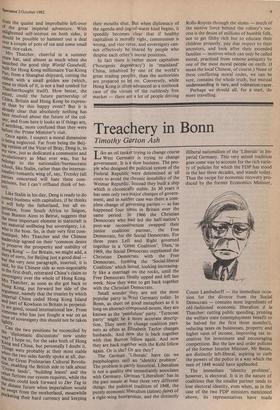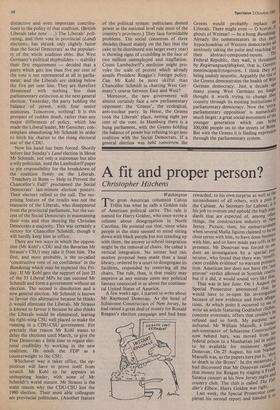Treachery in Bonn
Timothy Garton Ash
Ltke an oil tanker trying to change course WestGermany is trying to change government. It is a slow business. The peo- ple who designed the political system of the Federal Republic were determined at all costs to avoid the chronic instability of the Weimar Republic. Instead they built a ship which is chronically stable. in 30 years it has seen only two major changes of govern- ment, and in neither case was there a com- plete change of governing parties — as has happened four times in Britain over the same period. In 1966 the Christian Democrats who had led the half-nation's post-war reconstruction swapped their junior coalition partner, the Free Democrats, for the Social Democrats. For three years Left and Right governed together in a 'Great Coalition'. Then,c in 1969, the Social Democrats supplanted the Christian Democrats with the Free Democrats, forming the `Social-liberal Coalition' which lasted, looking increasing- ly like a marriage on the rocks, until the Free Democrats finally upped and left last week. Now they want to get back together with the Christian Democrats.
Small wonder they are not the most popular party in West Germany today. In Bonn, as short on good metaphors as it is long on abstract-compound-nouns, they are known as the `pendulum' party. 'Turncoat party' might be a more accurate descrip- tion. They seem to change coalition part- ners as often as Elizabeth Taylor changes husbands. And now she is back together with that Burton fellow again. And now they are back together with the Kohl fellow again. Or is she? Or are they?
The German 'Liberals' have (as we psephologists say) an `identity problem'. The problem is partly historical. Liberalism is not a quality one immediately associates with Germany. German 'Liberalism' has in the past meant at least three very different things: the political tradition of 1848, the purely economic liberalism (laissez-faire) of a right-wing bourgeoisie, and the distinctly
illiberal nationalism of the 'Liberals' in Im- perial Germany. This very mixed tradition goes some way to account for the rich varie- ty of policies for which the FDP has stood in the last three decades, and stands today. Thus the recipe for economic recovery pro- duced by the former Economics Minister,
Count Lambsdorff — the immediate occa- sion for the divorce from the Social Democrats — contains most ingredients of old-fashioned economic liberalism a la Thatcher: cutting public spending, pruning the welfare state (unemployment benefit to be halved for the first three months!), reducing taxes on businesses, property and higher rates of income, improving tax in- centives for investment and encouraging competition. But the law and order policies of the former Interior Minister, Mr Baum, are distinctly left-liberal, aspiring to curb the powers of the police in a way which the men of 1848 would have applauded.
The immediate `identity problem', however, is electoral. It is in the nature of coalitions that the smaller partner tends to lose electoral identity, even when, as in the case of the two FDP ministers mentioned ' above, its representatives have made distinctive and even important contribu- tions to the policy of that coalition. (British Liberals take note ...) The Liberals' poll- rating, and their vote in provincial (Land) elections, has shrunk only slightly faster than the Social Democrats' as the populari- ty of the whole coalition ebbs. But West Germany's political shipbuilders — stability their first requirement — decided that a party which gets less than five per cent of the vote is not represented at all in parlia- ment; and the Liberals are sinking below the five per cent line. They are therefore threatened with nothing less than parliamentary extinction at the next general election. Yesterday, the party holding the balance of power, with four senior ministries. Tomorrow, nothing! It is this prospect of sudden death, rather than any major differences of policy, which has made the Liberal leader, Mr Genscher, con- template abandoning Mr Schmidt in order to hitch his chariot to the rising electoral star of the CDU.
Now his hand has been forced. Shortly before last Sunday's Land election in Hesse Mr Schmidt, not only a statesman but also a wily politician, used the Lambsdorff paper to pin responsibility for the breakdown of the coalition firmly on the Liberals. 'Treachery in Bonn — Help to Prevent the Chancellor's Fall!' proclaimed the Social Democrats' last-minute election posters. Their electors rallied to the call. The sur- prising feature of the results was not the massacre of the Liberals, who disappeared from the provincial parliament, but the suc- cess of the Social Democrats in maintaining their vote and thus denying the Christian Democrats a majority. This was certainly a victory for Chancellor Schmidt, though it will hardly keep him in office.
There are two ways in which the opposi- tion (Mr Kohl's CDU and the Bavarian Mr Strauss's CSU) may take it from him. The first, and most probable, is the so-called 'constructive vote of no confidence' in the Bundestag which may be expected this Fri- day. If Mr Kohl gets the support of just 23 of the 53 Liberal MPs he can succeed Mr Schmidt and form a government without an election. The second is dissolution and a new general election. Mr Schmidt is known to favour this alternative because he thinks it would eliminate the Liberals. Mr Strauss is known to favour it because he also thinks the Liberals would be eliminated, leaving his right-wing CSU well placed to make the running in a CDU-CSU government. For precisely that reason Mr Kohl wants to delay the elections until March, to give the Free Democrats a little time to regain elec- toral credibility by working in the new coalition. He needs the FDP as a counterweight to the CSU.
Whichever way it takes office, the op- position will have to prove itself from scratch. Mr Kohl so far appears an uninspiring leader, with none of Mr Schmidt's world stature. Mr Strauss is the main reason why the CDU-CSU lost the 1980 election. Their most able colleagues are provincial politicians. (Another feature of the political system: politicians denied power at the national level rule most of the country's provinces.) They face formidable problems. The social consensus of three decades (based mainly on the fact that the cake to be distributed was larger every year) is showing signs of crumbling in the face of two million unemployed and stagflation. Count Lambsdorff's medicine might pro- voke the scale of protest which already assails President Reagan's foreign policy. Can Mr Kohl be more skilful than Chancellor Schmidt in charting West Ger- many's course between East and West?
Moreover, the new government will almost certainly face a new parliamentary opponent: the 'Greens', the ecological, anti-nuclear party. In Hesse, the Greens took the Liberals' place, netting eight per cent of the vote. In Hamburg there is a hung parliament, with the Greens holding the balance of power but refusing to go into coalition with the Social Democrats. If a general election was held tomorrow the
Greens would probably replace the Liberals. There might even — 0 horror, 0 ghosts of Weimar! — be a hung Bundestag. Already, the commentators in this most hypochondriac of Western democracies are anxiously taking the pulse and reaching Or their abstract-compound-nouns. The Federal Republic, they wail, is threatened by Regierungsunfahigkeit, that is, Govern' mentincapacitytogovern. I think they are being unduly neurotic. Arguably the rise of the Greens demonstrates the health of West German democracy. Just a decade ago many young West Germans no lunger thought it worth trying to change their country through its existing institutions of parliamentary democracy. Now the ,extra' parliamentary opposition' is numerically much larger: a great social movement of the younger generation which can bring 300,000 people on to the streets of Bonn. But with the Greens it is finding expression through the parliamentary system.







































 Previous page
Previous page